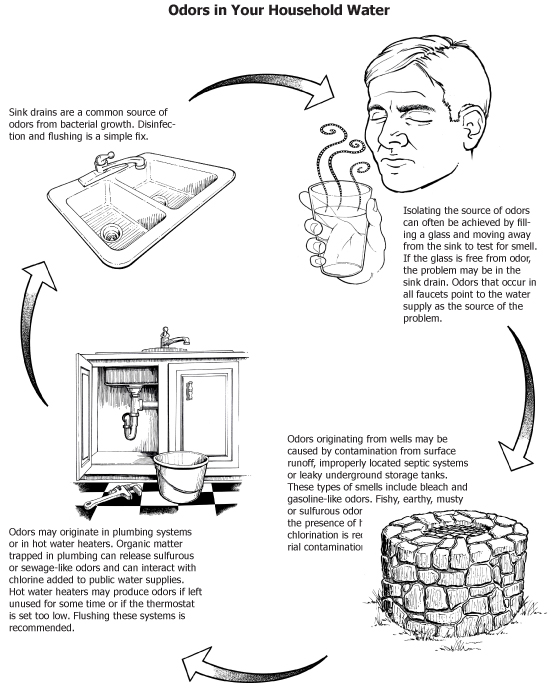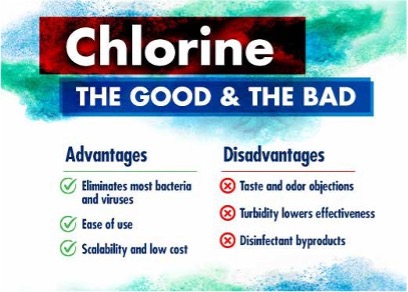Have you ever walked into your house and been hit by a strong smell of chlorine? It’s puzzling, right?
That distinct, sharp scent might remind you of a swimming pool, but when it fills your home, it can be quite unsettling. You’re probably wondering why this is happening and whether it’s safe. You might even feel a bit anxious about what it means for your living space and your health.
You’re not alone. Many people experience this odd phenomenon and are left searching for answers. The good news is that you’re in the right place to find them. This article will guide you through the possible causes of that chlorine smell, helping you understand why it’s there and what you can do about it. Stick around, because by the end of this read, you’ll have a clear plan to tackle the issue and regain the fresh, welcoming atmosphere you deserve in your home.
Common Sources Of Chlorine Smell
Have you ever walked into a room and thought, “Why does it smell like chlorine?” This common household issue often leaves people puzzled. Understanding the sources of this smell can help you address it effectively. Chlorine smells can originate from various sources in your home.
Swimming Pools And Spas
Swimming pools and spas often emit a strong chlorine odor. This happens due to the use of chlorine-based sanitizers. These sanitizers keep water clean and free from harmful bacteria. When pool water splashes around, it can leave a lingering smell. Ensure proper ventilation around pools and spas.
Cleaning Products
Many cleaning products contain chlorine or bleach. These products are effective for disinfecting surfaces. While cleaning, fumes can spread, causing a noticeable smell. It’s important to use these products in well-ventilated areas. This will help reduce lingering odors.
Water Supply Issues
Chlorine is often added to public water supplies. It helps kill germs and makes water safe to drink. If your water smells of chlorine, it could indicate high levels. Contact your local water provider for more information. They can provide details about the water’s chlorine levels.

Credit: extension.uga.edu
Health Implications Of Chlorine Exposure
Have you ever walked into your house and been overwhelmed by the smell of chlorine? While we often associate this smell with cleanliness, it’s important to consider the health implications of chlorine exposure in your home. Chlorine, commonly used in cleaning products and swimming pools, can pose risks to your health, especially when its scent lingers indoors. Let’s dive into how chlorine affects your respiratory system, skin, and eyes.
Respiratory Irritation
Breathing in chlorine fumes can irritate your respiratory tract. You might notice a burning sensation in your throat or a dry cough after exposure. Long-term exposure can lead to more serious conditions like bronchitis. If you find yourself coughing frequently, take a moment to consider whether chlorine might be the culprit. Could the cleaning products you’re using be affecting your lungs?
Skin And Eye Reactions
Chlorine can also irritate your skin and eyes. Have you ever felt a sting in your eyes after cleaning the bathroom? That’s chlorine at work. It can cause redness and itchiness, especially for those with sensitive skin. If your skin feels dry or itchy after touching surfaces cleaned with chlorine, it might be time to consider alternatives. Are your cleaning habits causing unnecessary discomfort?
It’s crucial to balance cleanliness with health. Consider using natural cleaning products to reduce chlorine exposure. Your home should feel fresh, not like a swimming pool. What steps can you take today to ensure a healthier environment for your family?
Identifying The Chlorine Source
Have you ever walked into your home and been greeted by the unmistakable scent of chlorine? It can be puzzling, especially if you don’t have a swimming pool nearby. Identifying the source of this smell is crucial not only for peace of mind but also for ensuring your environment is safe. Let’s dive into some practical steps to pinpoint where this chlorine scent might be coming from.
Inspecting Household Products
Start by taking a closer look at your household cleaning supplies. Many common cleaning products contain chlorine or chlorine-based compounds. Think of bleach, toilet bowl cleaners, and mold removers. Have you recently cleaned your bathroom or kitchen? These areas are hotspots for chlorine-based products.
Consider the storage areas where you keep these items. Are they tightly sealed? Sometimes, even a slight leak can spread a strong odor throughout your home. Check for spills or open containers that might be the culprit. You might be surprised how a small bottle can affect the whole room.
Checking Water Quality
Another potential source of the chlorine smell could be your water supply. Municipal water systems often add chlorine to disinfect the water. Have you noticed the smell when running the tap or taking a shower? If so, it might be your water.
Test your water quality using a simple home test kit available at most hardware stores. Compare the chlorine levels in your water with the recommended safety standards. If the levels are high, you might need a water filter to reduce the chlorine concentration.
Think about how often you consume tap water or use it for cooking. Could this be affecting your overall health? It’s worth investigating further. Ask yourself if the water is safe for your family.
By systematically checking these areas, you can likely identify why your house smells like chlorine. Remember, a little detective work goes a long way in maintaining a healthy home environment.

Credit: waterfilterguru.com
Quick Solutions To Eliminate Chlorine Smell
Chlorine smell in your house can be quite unsettling. It can remind you of swimming pools or cleaning agents. It’s important to address this quickly. Prolonged exposure might be harmful. Here are some effective solutions. They will help you eliminate the chlorine smell swiftly.
Ventilating The House
Open your windows wide. Let fresh air circulate through the rooms. This can help disperse the chlorine smell. Use fans to boost air movement. Position them to push air outside. This helps remove odors faster.
Consider using exhaust fans. They are effective in bathrooms and kitchens. They can pull out unwanted smells. Keep them running for several hours. This ensures the air inside stays fresh.
Using Natural Deodorizers
Place bowls of vinegar around the house. Vinegar is great for absorbing odors. It can neutralize the chlorine smell effectively. Let them sit for a few hours.
Baking soda can also help. Sprinkle it on carpets or furniture. Leave it for some time. Then vacuum it up. This will help in absorbing any lingering odors.
Essential oils can freshen up the air. Use lavender or lemon oil. They provide a pleasant aroma. Add a few drops to a diffuser. This can mask the chlorine smell effectively.
Preventive Measures
A house smelling like chlorine can be unsettling. Preventive measures can help maintain a fresh home environment. Regular maintenance and product choices play a vital role. By adopting a proactive approach, the strong chlorine odor can be minimized or avoided altogether.
Regular Maintenance
Regular maintenance keeps your home smelling fresh. Check and clean your water filtration systems. This reduces chlorine buildup. Inspect plumbing for leaks. Fix any issues promptly. Ventilate your bathroom and kitchen areas. Good airflow disperses odors. Regularly wash towels and bath mats. These can trap chlorine smells. A consistent cleaning schedule helps maintain a pleasant home environment.
Switching To Non-chlorine Products
Consider switching to non-chlorine cleaning products. Many alternatives clean effectively without strong odors. Look for oxygen-based bleaches. They offer a gentler option. Vinegar and baking soda work well for cleaning. Essential oils add natural scents. Use plant-based detergents for laundry. These reduce chemical residue. Opt for natural water treatment solutions. They limit chlorine use and maintain water quality.
When To Seek Professional Help
Persistent chlorine odors in your home might signal a hidden issue. If ventilation or cleaning doesn’t help, consider consulting a professional. This can ensure your safety and address potential concerns effectively.
When the smell of chlorine lingers in your home, it can be worrying. Chlorine is typically associated with pools and cleaning products. It shouldn’t be a constant home odor. Understanding when to call in professionals can save time and health issues.Persistent Odors
A chlorine smell that doesn’t fade could point to bigger problems. Cleaning products usually leave a temporary scent. If the scent lingers for days, it may signal a chemical leak. Or even a plumbing issue. Persistent odors often need expert investigation. Professionals can identify sources your nose can’t. They have tools to detect hidden chemicals. This ensures your home stays safe and comfortable.Health Concerns
A strong chlorine odor can affect health. Headaches and dizziness might occur. Some may experience breathing difficulties. Chlorine exposure can irritate skin and eyes. Prolonged exposure can escalate these issues. People with asthma or allergies may notice symptoms faster. Consulting professionals can prevent these health risks. They offer solutions tailored to your specific home situation. Prioritizing health is always essential.
Credit: culliganakroncanton.com
Frequently Asked Questions
Why Does My House Smell Like Chlorine?
Your house may smell like chlorine due to cleaning products. Check for leaks or spills.
Is A Chlorine Smell In The House Dangerous?
Yes, it can be harmful if concentrated. Ventilate your home and locate the source.
How Can I Remove Chlorine Smell From My Home?
Ventilate the area. Use fans and open windows. Neutralize with baking soda.
Can Plumbing Issues Cause A Chlorine Smell?
Yes, water treatment chemicals can cause this smell. Check your plumbing or water supply.
Does Mold Smell Like Chlorine?
No, mold usually smells musty. If you smell chlorine, investigate cleaning agents or leaks.
Conclusion
Chlorine smell in the house can be unsettling. Fixing it requires simple steps. Start by checking water sources. Leaky pipes or pools might be the culprits. Clean affected areas regularly. Ventilate your home well to disperse odors. Use fans or open windows.
If the smell persists, consult an expert. Professional help ensures safety and peace of mind. Prioritize fresh air and regular maintenance. Your home should feel welcoming, not chemical-laden. Enjoy a clean, pleasant environment every day. Follow these tips for a healthier home atmosphere.





